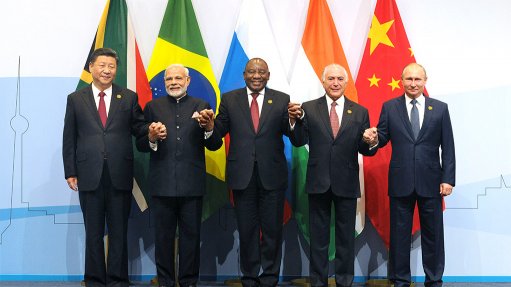
Chinese President Xi Jinping, Indian PM Narendra Modi, South African President Cyril Ramaphosa, Brazilian President Michel Temer and Russian President Vladimir Putin
Heads of State from Brazil, Russia, India, China and South Africa highlighted the benefits of multilateralism and cooperation for unlocking economic growth and development during the tenth Brics Summit, which took place in Johannesburg on Thursday.
In the open session chaired by South Africa’s President, Cyril Ramaphosa, the leaders expressed a desire for the five Brics countries to consolidate their cooperation within various other international institutions, including the World Trade Organisation (WTO) and the United Nations.
In a declaration signed by Brazilian President Michel Temer, Russian President Vladimir Putin, Indian Prime Minister Narendra Modi, Chinese President Xi Jinping and Ramaphosa, the leaders argued that the multilateral trading system was “facing unprecedented challenges”.
Nevertheless, they reaffirmed their support for the WTO, which the Heads of State said embodied a rules-based, transparent, non-discriminatory, open and inclusive trading system that promoted a predictable environment for trade.
“We call on all WTO members to abide by WTO rules and honour their commitments in the multilateral trading system,” the Johannesburg declaration read.
In his remarks, Xi said the five Brics countries should actively move to safeguard the rules-based trading system and “reject protectionism outright”.
Speaking through a translator, Xi encouraged his counterparts to continue to broaden the ‘Brics-plus’ network to other emerging and developing countries to widen support for greater international openness and inclusiveness.
Also speaking through a translator, Putin argued that the bloc had taken on the characteristics of a “real strategic partnership”, and proposed that greater efforts should be made to foster people-to-people exchanges between the five countries.
The leaders also welcomed the establishment of the Partnership on New Industrial Revolution (PartNIR), for which an advisory group had been created to support full operationalisation. The PartNIR was expected to deepen Brics cooperation “to maximise the opportunities and address the challenges arising from the Fourth Industrial Revolution”.
Speaking through a translator, Modi said that, in future “talent would become more important than capital”. However, he also cautioned that there was a risk that the Fourth Industrial Revolution could worsen inequality.
Also speaking through a translator, Temer stressed the need to recalibrate education and training systems to ensure that citizens were equipped to the changing demands of economies that would include greater levels of automation and artificial intelligence.
Ramaphosa said advances in technology had the potential to improve livelihoods and boost productivity, stressing that changes were not merely a digital revolution, but a fundamental shift in the way people lived and worked.
“However, unless it is approached in a collaborative manner, underpinned by a developmental agenda, rapid technological change could merely serve to entrench existing disparities within and between countries,” Ramaphosa cautioned.